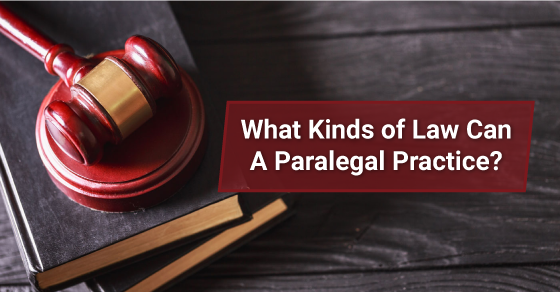
Paralegals are some of the most in demand professionals in the country at the moment. Rising legal costs, a limited number of lawyers, and a shift towards a more litigious business environment has led to the number of paralegals in Ontario rising by 35% in the past 5 years. One of the key reasons paralegals are such a hot commodity in Ontario specifically is due to their ability to practice certain types of law independently from a lawyer, as opposed to the typical legal assistant responsibilities they have in other provinces. Along with helping research upcoming cases and filing of legal documents, a paralegal in Ontario is legally permitted to offer a range of services to their clients without the supervision of a licensed lawyer. Let’s have a look at the kinds of law a paralegal can practice in Ontario.
Small Claims Court
Small Claims Court is a branch of the Canadian legal system that deals with civil disputes worth up to $25,000. Any kind of legal dispute that involves the payment or reimbursement of money or property up to $25,000 can be settles in Small Claims Court. This can include unpaid wages, rent, missed payment for goods and services tendered, or claims for damage against property, personal injuries, or breach of contract. Paralegals are permitted in Ontario to represent their clients independently in Small Claims Court, and can be an attractive option for many citizens looking to go through this legal process. As paralegal fees are usually substantially lower than a lawyer and the maximum payout of a Small Claims Court case is relatively low, it will make sense for many claimants or defendants to look to the services of a paralegal instead.
Criminal Summary Convictions
A Summary conviction offence is generally considered a less serious kind of infraction that carries a maximum sentence of 6 months prison or a $5,000 fine. These offences can be proceeded against summarily, without the right to a trial by jury but also without the risk of being indicted. Paralegals are eligible to represent clients in these cases without the need of a supervising lawyer, as the cases are generally straightforward and carry less severe repercussions than indictable offence cases. Examples of summary conviction offences would include trespassing, soliciting prostitution, counterfeiting, and vagrancy. These cases are always tried in a provincial court, and the accused must be charged within six months of the offence due to the statute of limitations.
Provincial Offences
This class of offence typically relates to municipal, vehicular and residential offences and come with set fines and charges. These include infractions such as speeding or parking offences, excessive noise and property damage complaints, dog attack incidences, environmental damage offences, and occupational work and safety issues. A majority of relatively minor infractions can be and are settled out of court by paying the amount written up on the ticket, however, certain more severe offences or in the event the accused wishes to fight the charge, the case can be brought before a judge. A paralegal is entitled to represent a client in these instances, and can be a good option for many people due to the relatively low risk nature of the offences and the wish to avoid excessive legal costs.
Boards and Tribunals
Paralegals are also eligible to represent clients in front of a limited range of boards and tribunals. These include:
Landlord and Tenant Board
One of the most common instances of having to deal with a tribunal or board relates to issues surrounding residential rights and disputes. The Landlord and Tenant Board is the official government body that administers the rules and regulations pertaining to rental agreements between landlords and their tenants, and can be called upon to settle arguments between the two parties. A paralegal can represent either a landlord or a tenant in these cases and can be expected to argue on rental payment timeliness or excessive increases, disagreements over amenities and services provided, evictions, and efficient repairs and quality of living arrangements.
Licence Appeal Tribunal of the Safety, Licensing Appeals and Standards Tribunal Ontario (SLASTO)
A relatively new provincial administrative office, the SLASTO is an amalgamation of several different regulatory bodies that oversees a range of dispute mediation services involving animal welfare, fire safety, licensing, policing, and criminal parole. Paralegals may represent clients in these cases in front of the tribunal independently of a lawyer as their extensive education covers all of these issues in depth. Some examples of the types of cases brought before the SLATSO include disputes over the health and safety of animals, cases relating to fire safety procedures, investigations into licensing and compensation claims, cases against policing services, and prospective parole seekers for sentences for fewer than two years.

Workplace Safety and Insurance Board
Another area that paralegals can assist clients with independently is in dealings with the Workplace Safety and Insurance Board (WSIB). These cases involve either workers or employers dealing with instances of injury, loss of income, workplace-related illnesses, damage to property, and emotional distress relating to workplace incidents. These can be legally and emotionally complex cases involving many thousands of dollars and must be handled with care. Paralegals are trained extensively in WSIB legislation and historical cases, making them a suitable choice for many clients wishing to take their case to the tribunal.
A career as a paralegal in Ontario is an exciting and rewarding one due to the heightened level of independence and professional responsibility afforded to paralegals in the province. If you are looking at pursuing this in-demand career, an excellent paralegal education is your first step. Cestar College offers one of the most well-respected paralegal courses in the province, and includes a 120 hour placement in a real world legal environment. For more information, simply head to our website and make an enquiry today.


